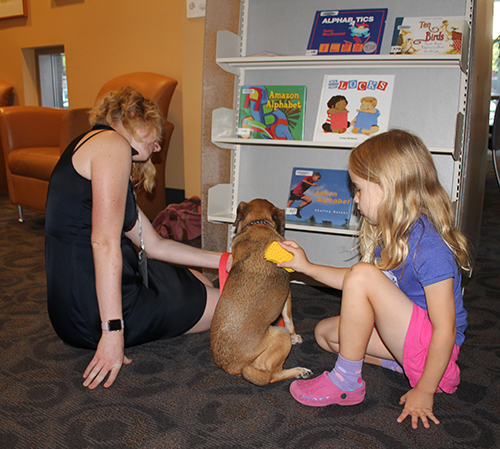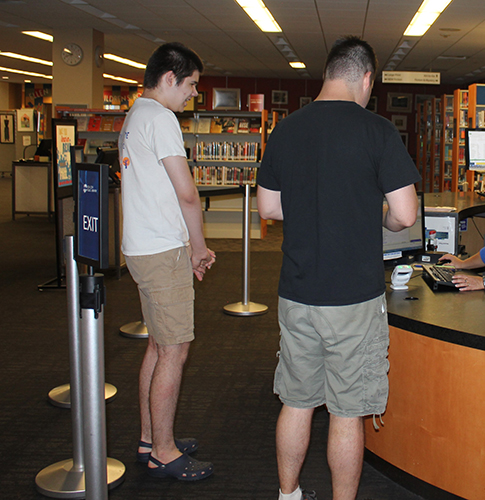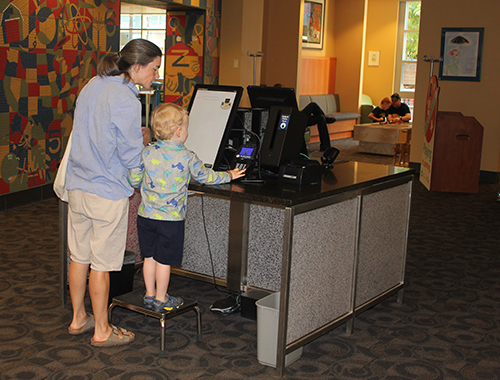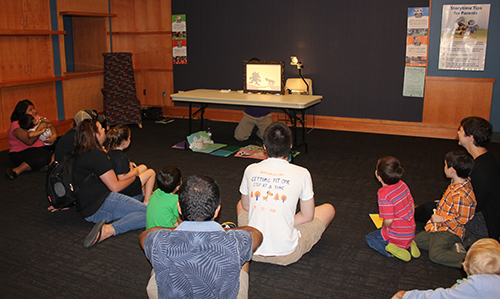Autism Accessible Browsing: a Community Effort at the Iowa City Public Library
 It's a simple enough story: two parents saw a need at their library, took initiative and worked with library staff to hold a program. On second glance, though, there is a lot libraries can learn from the experience of this group of three—spanning identifying unseen needs, involving expertise from outside the library, and community building to make the library accessible to more people.
It's a simple enough story: two parents saw a need at their library, took initiative and worked with library staff to hold a program. On second glance, though, there is a lot libraries can learn from the experience of this group of three—spanning identifying unseen needs, involving expertise from outside the library, and community building to make the library accessible to more people.
Read on to find out how Jessie Witherall and Dina Bishara, co-founders of the Iowa City Autism Community (ICAC) and each the mother of a child with autism, teamed up with Angela Pilkington, the Children's Services Coordinator at the Iowa City Public Library (ICPL), to affect change in their community, and how you might consider this type of program and collaboration for your library.
Jessie Witherell, parent: The ICAC is a group comprised of autistic adults, parents of children on the autism spectrum as well as general community members who are interested in local autism advocacy. Our group is a little different than many other autism groups in that we include actually autistic people in whatever we do. We ask people in our group what they feel our community needs regarding advocacy and accommodation and then act on those suggestions from there.
Dina Bishara, parent: One of our goals is to work for a community which is more accommodating and accepting of autistic people. Figuring out how to best accommodate autistic folks can sometimes seem challenging. We know that people in wheelchairs need ramps and elevators and wide doorways and automatic doors in order to access buildings. Many (but not all) autistic people struggle with crowds, noise, lights and other sensory stimuli. These struggles may be invisible and they vary from person to person, but they are significant, and they do, indeed, limit access to public places like grocery stores, restaurants, parks and libraries.
My 8-year-old autistic son went an entire year without visiting the library because the thought of all the children, the noise and the unpredictability was simply too overwhelming for him. . . . So the question we asked was, how can we create opportunities for autistic people to enjoy our library, and how can we work with the library to create a more accommodating space? — Dina Bishara, co-founder Iowa City Autism Community
Witherell: The subject of our local library came up a lot. Some autistic people were unable to handle the noise or bright lights of the library and would find the experience too overwhelming. The ICPL is a very busy and well-loved downtown library, so really it wasn’t necessarily that the building itself, wasn’t accommodating, it was simply that there were just too many people there at any given time. Many people or families simply gave up trying to go there. My own family had started to use the library a town over simply because it was quieter, but it didn’t have the same selection or quality of resources that our local library had. It really was an equity issue as far as we were concerned.
Bishara: My 8-year-old autistic son went an entire year without visiting the library because the thought of all the children, the noise and the unpredictability was simply too overwhelming for him. The library can also be a difficult place for parents of children on the autism spectrum to be. Most parents have been on the receiving end of disapproving looks and unsolicited parenting advice when their kids are acting in an unexpected way or are having a hard time under stressful conditions. So the question we asked was, how can we create opportunities for autistic people to enjoy our library, and how can we work with the library to create a more accommodating space?
Some cursory research revealed that aside from occasional "sensory storytimes" during regular library hours, very little had been attempted anywhere in the country to accommodate autistic needs.
Witherell: Dina had forwarded me an article about a Colorado Library who had hosted an autism-accessible browsing hour and we decided to propose a similar model for the ICPL.
 Angela Pilkington, librarian: In a perfect world everybody loves going to the library—a place where they don't feel judged, a place where they fell welcomed. In reality, many do not get that feeling when they step into a library. When you realize this or have it pointed out to you about your library, it stings.
Angela Pilkington, librarian: In a perfect world everybody loves going to the library—a place where they don't feel judged, a place where they fell welcomed. In reality, many do not get that feeling when they step into a library. When you realize this or have it pointed out to you about your library, it stings.
When I first received an email from Dina Bishara and Jessie Witherell, it did sting; not their words, they didn’t say one negative word about the library. I was hurt that someone didn’t want to come to my library. I pride myself in how welcoming and inclusive my staff and I are in the Children’s Department at ICPL, and to realize that some of our youngest community members did not like coming here, because of the noise, or the lights or because they felt they were being judged, hurt. After a quick glance at the article from Public Libraries Online they sent by Katherine Weadley, who was then the children's cataloger at the Longmont Public Library in Colorado, and speaking to her, I knew this type of program would work at our library and we had to do it to take that sting away. But how?
The first step was to have a meeting with ICAC. Dina, Jessie and I sat down one evening in the children's department and talked about what we could envision our event looking like. From the start, I knew I wanted them to handle the promotion language of any flyers or press releases that would go out to the community. The reasoning was simple, they know their community and they know the language that is best used. We also started to talk about what activities we would like to see happen in that special hour.
 Bishara: We were thrilled when they said yes, and got to work figuring out the details. The ICPL offered to open their doors one hour early on a Saturday morning in order to provide a calmer, quieter library experience for autistic people and their family or caregivers. We arranged for two therapy dog teams to be on hand for children (and adults!) to pet and hug and, sometimes, drape themselves over. The library arranged for a special storytime with a story-teller who has worked with autistic audiences before. They also agreed to dim the lights and allowed us to set up a resource table near the entrance.
Bishara: We were thrilled when they said yes, and got to work figuring out the details. The ICPL offered to open their doors one hour early on a Saturday morning in order to provide a calmer, quieter library experience for autistic people and their family or caregivers. We arranged for two therapy dog teams to be on hand for children (and adults!) to pet and hug and, sometimes, drape themselves over. The library arranged for a special storytime with a story-teller who has worked with autistic audiences before. They also agreed to dim the lights and allowed us to set up a resource table near the entrance.
Pilkington: With just a few more emails between us, we just did it. We jumped right in, not knowing if anyone would come or if we would have a huge group. In the end, 62 people showed up on a bright, sunny Saturday morning. I had talked through the entire process with the staff in the children's department and then with the entire staff about three weeks prior to the Special Access hour. The staff that worked that morning made everything go smoothly. I greeted everyone at the door, another staff member was in the storytime room with our performer, and two more at the children's desk to answer questions, help with the computers or to help find books. We also had staff at our circulation desk to help out on the adult side and to issue cards. ICAC sat up a table with information about autism and their group. Overall, it was a fantastic morning. Every face that came through the door had a smile. They knew we had done this just for them. They were there among friends, doing things they love.
"We jumped right in, not knowing if anyone would come or if we would have a huge group. In the end, 62 people showed up on a bright, sunny Saturday morning. . . . Every face that came through the door had a smile. They knew we had done this just for them. They were there among friends, doing things they love." — Angela Pilkington, the Children’s Services Coordinator
Witherell: I believe it was a great success. I personally know many of the families who came and can honestly say that the group was much more cheerful, relaxed and open to staying for a longer period of time than they otherwise would have been. I think that, especially for the children, it was a great way for them to open up and explore the library on their own terms. In addition, we had several adults and teenagers attend and we're hoping to they will feel welcome and encouraged to come again for the next event, which will be in November. The North Liberty Community Library, another local library, has reached out to us and we collaborated with them to host an accessible browsing hour of their own. It will be open to not only people on the autism spectrum but also people who have similar conditions like ADHD or PDD-NOS that would make going to a busy library a challenge. There will be sensory tables, a therapy dog and a therapeutic miniature pony.
 Pilkington: My goal for the day was to be inviting and to be the library everyone deserves. This would be my advice for any librarian wondering if this would work at their library. For us, we found another library 20 minutes from us to switch off monthly with. I would love to have this event every month, and who knows? Maybe we will! We have received so much positive feedback from the community that I can see it happening in the new year. Reach out to your local autism community group. If you’re not sure your community has a group, talk to the local schools and hospital, they will point you in the right direction.
Pilkington: My goal for the day was to be inviting and to be the library everyone deserves. This would be my advice for any librarian wondering if this would work at their library. For us, we found another library 20 minutes from us to switch off monthly with. I would love to have this event every month, and who knows? Maybe we will! We have received so much positive feedback from the community that I can see it happening in the new year. Reach out to your local autism community group. If you’re not sure your community has a group, talk to the local schools and hospital, they will point you in the right direction.
If you can't devote an hour before opening or after closing, then maybe try having a special storytime hour or a special performer come in just for individuals on the spectrum. Have a program geared to all first, then the same program for special access viewing the next hour.
Helping someone rediscover, fell welcomed and love the library as much as you is worth the little effort that goes into bringing this event to your library!
Bishara: Most communities have only just started soliciting the perspectives of autistic people and the parents of autistic people to learn how we can best accommodate their unique needs. It may take a bit of effort but it is well worth it to send the message that our libraries belong to all of us, and everyone is welcome.
Photos, from top:
Mom and daughter enjoying one of the two therapy dogs who were a part of the morning. The dogs were a big hit and received lots of love from patrons.
Teen and dad checking out their selections.
Mom and son at the self-checkout, while in the background, a dad and his son play at the train table together. Some lights were were turned off to help with sensory overload.
Local performer Darrin Crow, who has experience working with kids on the autism spectrum, performs a storytime shadow puppet play for the kids.
All photos are by Meredith Hines-Dochterman and provided courtesy of ICPL.
Resources for serving patrons on the autism spectrum
WebJunction free course Serving Library Users on the Autism Spectrum
WebJunction free webinar Serving the Underserved: Children with Disabilities at Your Library
A write-up of the above webinar Welcoming Children with Disabilities at Your Library
More resources:
Libraries and Autism: Customer Service Tips (pdf)
Sensory Storytime related posts in ALSC Blog
